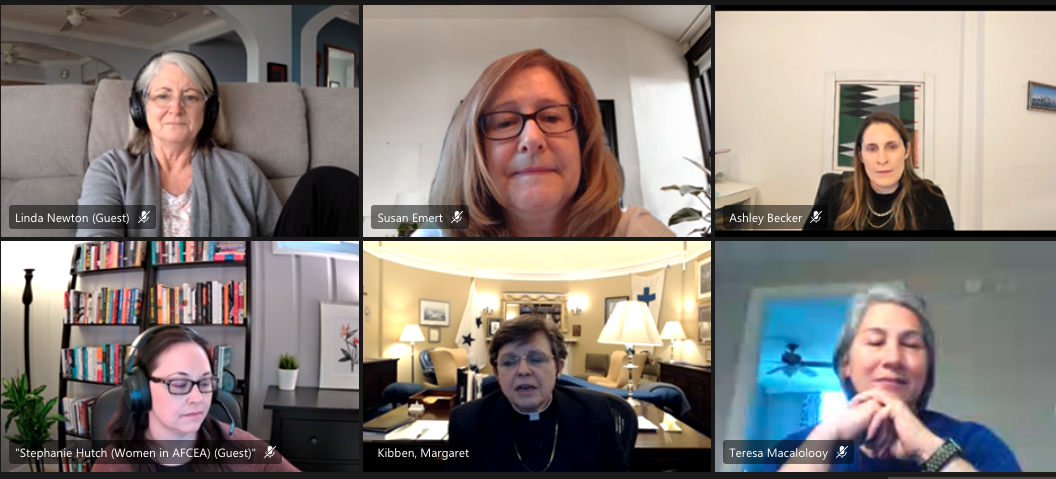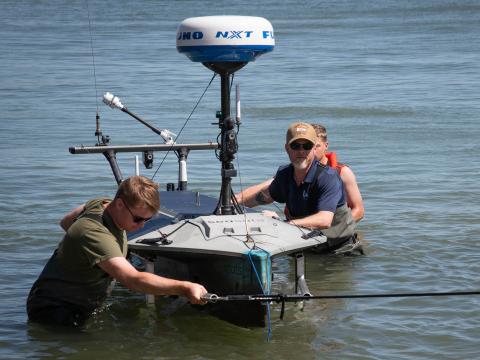Women in AFCEA Celebrate Women’s History Month
Rear Adm. Margaret Grun Kibben, USN (Ret.), chaplain of the House of Representatives, was only 14 when she got the call into ministry. Though she knew early on what she wanted to be, it would take years for her to own her voice and her authority.
Adm. Kibben was the first woman to do a lot of things. She was the first—and only—woman to serve as chaplain of the U.S. Marine Corps; as chief of chaplains of the U.S. Navy; and in her current position as chaplain of the U.S. House of Representatives. But that’s not the story.
“I don’t know what it’s like to be the first. I know what it’s like to be me. The story really is that I’m able to provide ministry here and it doesn’t matter what my gender is. I’m able to serve here and from this point forth no one is going to have that barrier. That’s the story,” emphasizes the admiral.
She credits a lot of her early success to her supportive family and her decision to attend an all-female college, a decision made somewhat in vain. Her high school boyfriend was attending the Naval Academy and she wanted to be close. Goucher College, which was all female at the time, was the nearest school she could go to.
After she was accepted, the boyfriend broke up with her, but she was locked in. In the end, it was truly a gift, Adm. Kibben says. “I knew if I had been in a class where there had been guys, I probably wouldn’t have spoken up. I probably wouldn’t have been as assertive. I wouldn’t have been as comfortable discovering who I am and my gifts and leaning into my own intelligence if there were people there I felt like I had to impress,” she adds.
While attending seminary at Princeton, she joined the Chaplain Candidate Program for the Navy. “This was my fulfillment of my understanding of my calling,” Adm. Kibben says. She began active duty as quickly as she could.
Her first duty station, at age 26, was with a Marine unit. It was one of the first times people had seen a female chaplain and there was pushback from the commanders. They wanted Adm. Kibben to focus on the women and she was placed in battalions that were mostly female.
But Adm. Kibben pushed back. “I would say I’m happy to talk to the women but to be honest you’re doing a disservice first of all to the male chaplains, because you’re saying they can’t talk to women, that they don’t have the ability to connect with women, which I think was obviously a bad premise,” says the admiral.
The other thing the commanders didn’t realize was “a lot of men are coming to me because I am a woman. Maybe there’s intrigue, maybe it’s the mother figure or sister figure, but there’s a sense that men want somebody who isn’t going to judge their own masculinity by some of the problems that they’re bringing to the table. So while I appreciate what you [the commanders] are trying to do, I think your vision is limited. Let’s just let it play out the way it is,” she adds.
It didn’t take long for Adm. Kibben to realize that it wasn’t such a matter of prejudice of being a woman, it was a matter of opportunity. In 1989, after her first duty tour, the Naval Academy decided it wanted its first female chaplain. Adm. Kibben’s name was one of three put forward. It was an incredible privilege, but it was because she was a woman that she was even given the opportunity.
“They would not have considered me because it was only going to be my second tour, and they like to have someone who has a little salt on them, who has been to sea, before they send them to the academy,” she admits.
The admiral was also young—29 at the time—only about 10 years older than the average midshipman. “I don’t look my age. I look like I’m their age so they really are taking a risk with me,” Adm. Kibben says. “But it’s the opportunity because I was a woman, and that was not lost on me.”
She will tell you it was a mistake. “I had a wonderful tour. I was well appreciated. I enjoyed it immensely. However, because I didn’t have the salt, because I didn’t have my sea legs really, I did not own my voice yet. I didn’t own my authority as a chaplain,” the admiral states.
It was difficult for her to venture into Bancroft Hall or visit midshipmen's rooms and engage with them as a chaplain wants to do. “That was a whole new environment for me; it was just a little too close to home. Fortunately, it all worked out,” she says.
It’s not just being a woman; it’s also coming to find one’s own voice, one’s own authority. “That is true I think for everyone new to a career, but I would argue that women in many cases, especially in male dominated fields, have a hard time finding their voice, and then once they find it, owning it and using it,” Adm. Kibben states.
The next challenge she faced was not so much with men, but with women. There were a lot of groundbreakers in the Chaplain Corps at that point. Adm. Kibben was the second generation of female chaplains and the senior women really were the ones who had to carve out the path for Adm. Kibben and others.
“They were so wounded on their journey that they wanted to make sure that I understood there was no such thing as a free lunch. They had paid the dues for me. And I needed to understand how much I owed them. That was sort of a weird dynamic,” she says. “I certainly appreciated what they had done but there was a ‘you should revere me because I’ve been there before you.’ It was an odd dynamic and it caught me off guard,” the admiral admits.
The effect would trickle down. “Because I was wounded by women, I looked at them with a very critical eye,” says Adm. Kibben. “What kind of woman are they? Do they have a female agenda or do they have a humble heart for ministry? And I will confess, I probably was harder on woman than I should’ve been,” she says.
“Ducks look for ducks. I was looking for people like me. But that doesn’t bring you diversity. You need some women who are going to rock the boat. You need people who are going to see things differently. It took me a while to break that code and it wasn’t until I was much more senior,” Adm. Kibben remarks.
One of the biggest lessons she has learned along the way is the importance of balance. “Not necessarily work/life balance because I don’t think that’s quite accurate. I think there’s much more to it. It’s family, it’s health, it’s spiritual and if you’re not taking care of all three, call it a three-legged stool, if one of those legs on the stool is shorter than the other, you will fail,” states the admiral.
Her other advice is to simply be yourself. “Once I realized who myself is, people were actually asking for me because of me, because of my gifts and my qualities,” Adm. Kibben says. When she served as command chaplain in Afghanistan she was “a small, white, Christian woman walking into very male dominated areas. I can’t not be a woman, and in fact, that’s why they wanted to talk to me,” she relates.
That’s where the entrée lies. People really appreciate authenticity. They really appreciate hearing your thoughts. Just be fellow humans on this team called life, says Adm. Kibben.




Comments